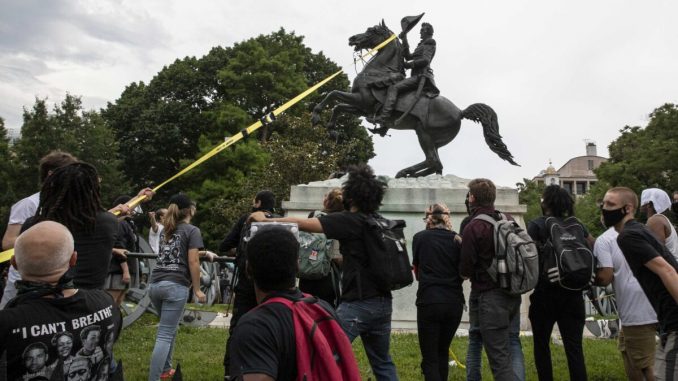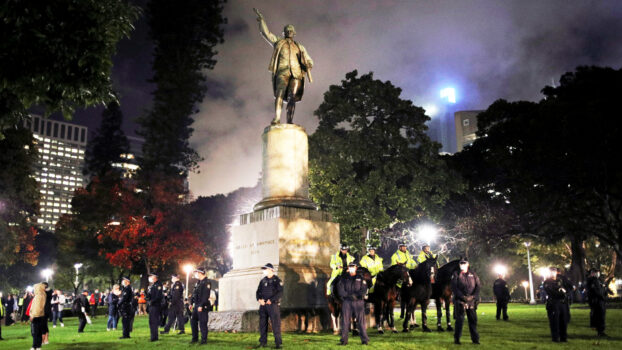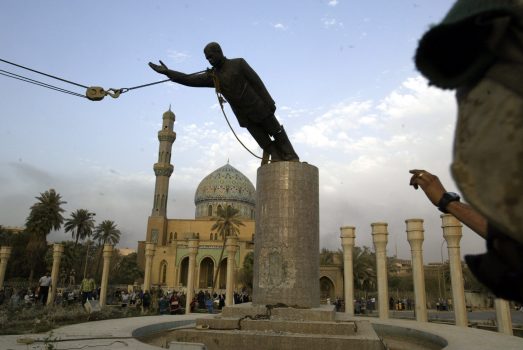
Commentary
Most people believe that the study of history involves an accurate and objective description and evaluation of events that happened in the past. However, the Black Lives Matter movement, which is making headlines throughout the world, has changed this understanding of “history.”
As is well-known, the movement depicts the history of the United States as an egregious example of exploitation, discrimination, and racism. To eradicate the continuing consequences of this culture of endemic racism, the movement seeks to rewrite history by evaluating past events in the light of its progressive understanding of morality.
In this context, the proponents of the movement make incessant demands to remove monuments and statues of people who are deemed to have contributed to, or profited from, racism.
There have been calls to remove, or even destroy, the statues of confederate generals, notably Robert E. Lee, and the discoverer of the Americas, Christopher Columbus, among others.

In the United States, demonstrators even demanded that all copies of Gone with the Wind be destroyed because it portrays a scene about slavery in the South. This is perhaps the most popular and best movie ever made, an icon of American cinema.
In Boston, a statue of Christopher Columbus located in Waterfront Park was beheaded and removed. The corpse and the head were dumped in the Boston Harbour, like the tea during the Boston Tea Party which precipitated the War of Independence.
It appears that this movement has unstoppably infected many other liberal democracies too. This infection is also sometimes referred to as the “cancel culture movement.”
For example, in the United Kingdom, officials in East London removed a statue of the 18th century merchant and slave owner Robert Milligan from its place in the city’s docklands. Protestors in Bristol knocked down a monument erected to honour the legacy of slave trader Edward Colston.

The mayor of London announced that more statues of colonial figures could be removed from Britain’s streets. He tweeted that, “It’s a sad truth that much of our wealth was derived from the slave trade—but this does not have to be celebrated in our public spaces.”
There have been calls for Oxford University to remove a statue of Cecil Rhodes, a Victorian imperialist in southern Africa who made a fortune from mines and endowed Oxford University’s Rhodes scholarships. Oxford University itself recommended the removal of the statue even though Rhodes is invariably connected with the history of this university. A “Rhodes Must Fall Group” has been actively agitating for the removal of Rhodes’s statues.
In Australia, activists have demanded the removal of the statue of Captain James Cook from Sydney’s Hyde Park. This statue, erected in 1879 bears the inscription “Discovered this territory 1770.”
In an opinion piece, Professor Sarah Maddison argued that statues must fall because these statues “do not educate, they do not inform, they do not move us closer to justice.” She further contended that, “What some may have considered enlightened more than 200 years ago can be reckoned with as atrocity today.”
But her argument fails to consider that actions, which are considered as enlightened in our time, may be regarded as examples of barbarity 100 years from now. No generation has a monopoly on “enlightenment” because it is a concept that constantly develops over time. Additionally, in removing or destroying statues, people effectively distort a country’s history.

How is it possible to cancel the historical heritage and culture of a country?
Culture evolves over time and is inextricably intertwined with a country’s history. Nevertheless, there have been many attempts throughout the ages to rewrite history and to purge unwanted stories from the history books. These examples are as plentiful as they are objectionable.
One only needs to mention the destruction by the Taliban of the magnificent Buddhas of Bamyan in Afghanistan. These were carved into the side of a cliff, almost 2,000 years ago and were destroyed in March 2001 because they depicted faces. The government deemed such depiction to be incompatible with its version of the Islamic religion.
This fanatical event also reminds us of the destruction of the ancient site of Palmyra in war-torn Syria by ISIS, and the Temple of Baalshamin dedicated to the ancient God Baal.
We are also reminded of the graphically-challenging television pictures of Saddam Hussain’s statue in Baghdad, being toppled by an enraged and liberated crowd. People danced on the statue of the dictator and used sledgehammers to pulverise it to pieces.

Saddam was clearly a modern-day despot, who was undoubtedly responsible for many atrocities. But the toppling of his statue raises an interesting question: Is it justifiable to destroy his statue, but not the statue of, say, Christopher Columbus, Robert E. Lee, or James Cook?
Is it the case that, with the passage of time, statues gain a protective veneer which hides the alleged or real crimes committed by these historical figures? At what point in time does a statue become a historical relic and a part of the history and culture of a country? These are difficult questions to answer because historical figures often have a complex history.
Unfortunately, today’s history books are replete with inaccurate accounts of the past. So, while the Black Lives Matter movement may be well-intentioned, it is ultimately a misconceived attempt to edit history.
There is a need to return history to its rightful place in the study of the humanities. Societies should learn from history, not destroy it. Students should be educated about the failures of America, including, of course, the history of racial discrimination and slavery, but should also be encouraged to celebrate its glorious achievements and contributions to the maintenance of the Free World.
Gabriël A. Moens AM is an emeritus professor of law at the University of Queensland. He has authored a debut novel on the origins of COVID-19 called, A Twisted Choice (Boolarong Press, 2020).
Views expressed in this article are the opinions of the author and do not necessarily reflect the views of The Epoch Times.





Be the first to comment